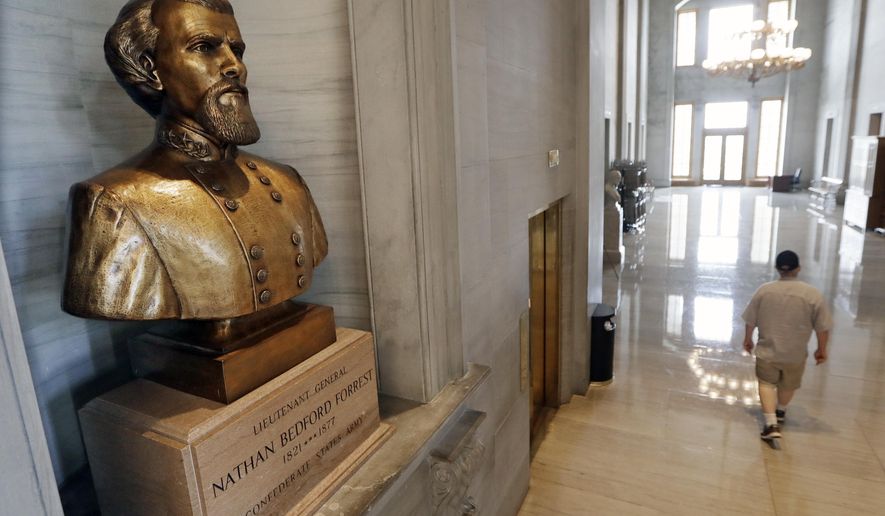NASHVILLE, Tenn. (AP) -
As more calls grow across the country to remove Confederate statues, Republican lawmakers in Tennessee remained steadfast Tuesday in their resistance to removing a bust of a former Confederate general and Ku Klux Klan leader on prominent display in the state capitol.
However, legislation that would stop designating July 13 as Nathan Bedford Forrest day advanced in the House - even though a conflicting version is also making its way in the Senate.
“Nathan Bedford Forrest is in fact racist … and you’re making everybody in the state of Tennessee celebrate this man with a state holiday,” said Rep. London Lamar, a black Democrat from Memphis.
As they have in the many years arguing over the contentious bust, many GOP lawmakers echoed previous stances that they did not want to “erase” or “mess with” the state’s history. Meanwhile, their fellow black colleagues stressed that the state’s continued honoring of Forrest remains deeply painful for them and others who visit the state’s Capitol.
“What if everyday you walked into the House or Senate chambers and you saw a bust of Hitler before you entered?” tweeted Rep. Antonio Parkinson, a black Democrat from Memphis. “That sickness in the pit of your stomach that you’re feeling right now … that’s what we feel every time we enter the Capitol of Tennessee.”
Ultimately, a House legislative panel - after heated debate - spiked a Democratic resolution urging the removal of Forrest’s bust from inside the Capitol.
In Tennessee, state law requires the approval of the Capitol Commission and state’s Historical Commission to remove the bust. However, the Capitol Commission rarely meets - a trait that has sparked anger from some lawmakers who have accused the panel of shirking its duties.
Republican Rep. Jerry Sexton said the bust of Forrest should not be removed because he feared it would open the door to removing those of other contentious historical figures.
Forrest was a former Confederate cavalry general who amassed a fortune as a plantation owner and slave trader.
“It was not against the law to own slaves back then. Who knows, maybe some of us will be slaves one of these days. Laws change,” said Sexton, who is white.
Yet after spending hours going through various bill proposals, the House panel agreed to advance Lamar’s proposal that would remove the designation of July 13 as Nathan Bedford Forrest Day.
The bill conflicts, however, with a separate bill that gained traction in the Senate earlier that Tuesday. The Senate’s version would simply remove the requirement that forces the governor to issue a proclamation honoring Forrest and other state designations throughout the year.
An original version of the bill removed the Forrest designation - mimicking the House version - but was later tweaked after the bill’s sponsor conceded that version did not have enough support among lawmakers.
The newly overhauled version of the bill sparked criticism from Democratic members- particularly from the black lawmakers - who argue its past time for the state to stop honoring Forrest.
“I will be removing my name as a cosponsor,” said Sen. Brenda Gilmore, a black Democrat from Nashville. “Eliminating the proclamation is simply not enough and it is a sign of the times that, here in Tennessee, we are still fighting over whether a dead man who bought, sold, tortured and massacred black people should be honored at our state Capitol.”
According to the current law in question, Tennessee governors must sign six proclamations throughout the year designating the following days of special observance: Robert E. Lee Day (January 19), Abraham Lincoln Day (February 12), Andrew Jackson Day (March 15), Confederate Decoration Day (June 3), Nathan Bedford Forrest Day (July 13) and Veterans’ Day (November 11).
Gov. Bill Lee received national backlash last year when he not only signed the Nathan Bedford Forrest proclamation, but also declined to answer reporter questions over whether he thought the law should change. Lee has since stated that he didn’t like signing the proclamation and would prefer to see the law changed.




Please read our comment policy before commenting.